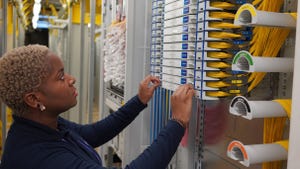FCC data shows Charter is largest ACP provider at $910M
FCC data shows Charter as the largest provider in both the Emergency Broadband Benefit and Affordable Connectivity Program, taking in $1.5 billion since 2021.

New data published by the FCC, in response to a Senate inquiry, reveals how much funding the commission has committed to providers through its affordable broadband programs, including the Emergency Broadband Benefit (EBB) and its successor, the Affordable Connectivity Program (ACP).
According to that report, Charter Communications is far and away the largest participant in both programs. The data shows provider obligations (how much funding the FCC owes), disbursements (how much the FCC has paid out) and remaining obligations (the difference) as of the end of February 2023.
Charter's EBB obligations were $637 million, and its ACP obligations were $909.97 million, according to the FCC's data. The EBB – which provided a $50 monthly subsidy – was replaced by $30/month ACP at the end of 2021, following the passage of the Infrastructure Investment and Jobs Act (IIJA).
Asked about the ACP on the company's recent Q1 earnings call, Charter CEO Christopher Winfrey implied the company was the top provider but declined to give numbers.
"On ACP, we're not going to get into specific numbers other than to say -- it's a big program for the government. It's important to the government, and we've been very active in deploying ACP at their request. It's been very successful," said Winfrey, according to an Atom Finance transcription. "The vast majority of the customers we have were already existing customers who are now benefiting from that benefit. And we are, we believe, the largest ACP participant. And we're hopeful that the government continues to renew that program over time because we think it's a good program and it's been important, and it's a good benefit in the marketplace."
Reached for comment by Light Reading, a spokesperson for Charter said the company had nothing to add at this time.
After Charter, the next biggest player in ACP is Q Link Wireless, at $288 million. Below is a chart showing the top 15 provider participants in the ACP with their funding commitments through February 28, 2023, as well as their funding amounts from the EBB.
Provider | ACP Obligations | EBB Obligations |
Charter Communications | $909,976,214.76 | $637,009,773.79 |
Q Link Wireless | $288,168,732.81 | $304,192,813.45 |
Tracfone Wireless | $250,243,398.17 | $266,667,670.61 |
Comcast Cable | $232,390,273.39 | $122,084,652.80 |
T-Mobile | $207,995,596.80 | $386,348,115.66 |
AT&T | $188,351,846.80 | $103,857,038.13 |
Excess Telecom | $181,777,765.00 | $174,349,245.00 |
Sage Telecom | $168,626,743.72 | $164,603,961.34 |
Dish Wireless | $119,721,885.00 | $105,174,333.00 |
Cox | $117,750,966.66 | $77,603,965.81 |
Maxsip Telecom Corporation | $114,215,720.85 | $9,673,590.00 |
TruConnect | $70,133,460.50 | $95,811,396.23 |
Air Voice Wireless | $60,405,587.24 | $5,237,390.00 |
Global Connection Inc. of America | $59,031,135.69 | $108,483,424.72 |
(Data is current as of February 28, 2023. Source: FCC**)
The FCC published ACP and EBB provider data in a larger report it assembled in response to an inquiry from Senators John Thune (R-SD) and Ted Cruz (R-TX) into what action has been taken to stem waste, fraud and abuse of pandemic-era broadband programs.
Specifically, the Senators were seeking enrollment and disbursement information on the Emergency Broadband Benefit, ACP, COVID-19 Telehealth program and the Emergency Connectivity Fund, as well as how the FCC has responded to said waste, fraud and abuse.
The letter followed a report from the Office of Inspector General (OIG) last year warning about abuse with the ACP.
In its report responding to Senators Thune and Cruz, the FCC said that 10,054 subscribers were "de-enrolled" in EBB, as well as 241,433 in ACP, following "program integrity reviews." Additionally, the FCC has de-enrolled 11,685 ACP subscribers this year "based on a determination that these subscribers no longer meet the criteria to be considered an eligible household."
De-enrollments per year by amount were $228,708 in 2023 and $18,435,554 in 2022. Total de-enrollments for EBB were $39,930,901.
The FCC also included examples of penalty letters sent to providers that the commission said violated program rules.
That includes a proposed $62 million penalty the FCC leveled against Q Link Wireless in January. According to the FCC, the second-largest provider in ACP received a proposed penalty for "overclaiming support for hundreds of thousands of computer tablets" through EBB, resulting in "at least $20,792,800 in improper disbursements."
ACP's financial future
The $14.2 billion ACP was passed as part of the 2021 IIJA to provide a $30 monthly subsidy for broadband to qualifying low-income households. It was meant to be the long-term successor to the EBB, passed as an emergency measure during the early days of the COVID-19 pandemic, which offered a $50 monthly subsidy. The program also offers up to $100 toward a digital device.
But while waste is a central concern with the program, so is the fact that it may run out of funding as soon as next year – dealing a blow to the nearly 18 million US households currently relying on the program (as of the latest data) as well as the providers with millions of dollars of ACP money on their balance sheets. According to the FCC, more than 1,700 service providers are authorized to participate in the program.
Indeed, industry groups, state broadband officials and analysts alike are sounding the alarm on the need for Congress to fund the ACP again or risk making broadband access unaffordable for millions of Americans, just as the federal government prepares to spend $42.5 billion through the Broadband Equity, Access and Deployment (BEAD) program to close the country's remaining connectivity gaps. However, with Congress and the White House at an impasse over the debt limit and social programs, it's unclear when or if that may happen.
[*Update, 5/19/2023: The information cited above was made public and reviewed by Light Reading at the time of this article's publication but has since become unavailable to download and labeled confidential.]
[**Update, 6/6/23: The FCC republished what appears to be the original source document on Friday, June 2, 2023, available here.]
Read more about:
ACPAbout the Author(s)
You May Also Like




.jpg?width=300&auto=webp&quality=80&disable=upscale)







